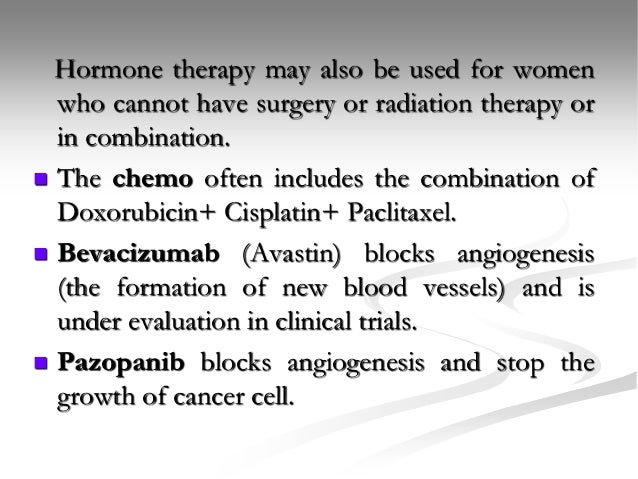Hormone Therapy for Cervical Cancer

What is Hormone Therapy?
Hormone therapy is a type of cancer treatment that uses hormones or hormone-blocking drugs to slow down or stop the growth of cancer cells. Hormones are natural substances made by the body that regulate various functions, including growth and reproduction. In some cases, hormones can also stimulate the growth of certain types of cancer cells. Hormone therapy works by blocking the production or activity of these hormones, which can slow down or stop the growth of cancer cells.
How Does Hormone Therapy Work for Cervical Cancer?
Hormone therapy is not a common treatment for cervical cancer, but it can be used in some cases. Cervical cancer is often caused by a virus called human papillomavirus (HPV), which can affect the cells in the cervix. In some cases, HPV can cause changes in the cells that make them grow abnormally and become cancerous. Hormone therapy for cervical cancer works by blocking the production or activity of certain hormones that can stimulate the growth of these abnormal cells.
Types of Hormone Therapy for Cervical Cancer
There are two main types of hormone therapy that can be used to treat cervical cancer:
- Progesterone therapy: This type of hormone therapy uses a hormone called progesterone to slow down the growth of cancer cells. Progesterone is a female hormone that is produced by the ovaries. In some cases, progesterone can help to stop the growth of cervical cancer cells.
- Gonadotropin-releasing hormone (GnRH) agonists: This type of hormone therapy works by blocking the production of estrogen, which can stimulate the growth of cervical cancer cells. GnRH agonists are drugs that can be injected or given as a nasal spray.
Advantages of Hormone Therapy for Cervical Cancer
- Hormone therapy can be less invasive than other types of cancer treatment, such as surgery or radiation therapy.
- Hormone therapy can be effective in slowing down or stopping the growth of cancer cells.
- Hormone therapy can be used in combination with other types of cancer treatment to improve the overall effectiveness of treatment.
Disadvantages of Hormone Therapy for Cervical Cancer
- Hormone therapy can cause side effects, such as hot flashes, mood changes, and vaginal dryness.
- Hormone therapy may not be effective in treating all types of cervical cancer.
- Hormone therapy may not be a long-term solution for treating cervical cancer and may need to be used in combination with other types of treatment.
FAQ:
1. Is hormone therapy a common treatment for cervical cancer?
No, hormone therapy is not a common treatment for cervical cancer, but it can be used in some cases.
2. What are the side effects of hormone therapy for cervical cancer?
The side effects of hormone therapy for cervical cancer can include hot flashes, mood changes, and vaginal dryness.
3. How does hormone therapy work for cervical cancer?
Hormone therapy works by blocking the production or activity of certain hormones that can stimulate the growth of abnormal cells in the cervix.
4. Can hormone therapy be used in combination with other types of cancer treatment?
Yes, hormone therapy can be used in combination with other types of cancer treatment to improve the overall effectiveness of treatment.
In conclusion, hormone therapy can be an effective treatment option for some women with cervical cancer. It works by blocking the production or activity of certain hormones that can stimulate the growth of abnormal cells in the cervix. However, hormone therapy may not be effective for all types of cervical cancer and can cause side effects. If you have been diagnosed with cervical cancer, it is important to discuss all of your treatment options with your doctor to determine the best course of action for your individual situation.
